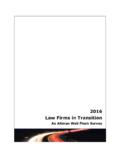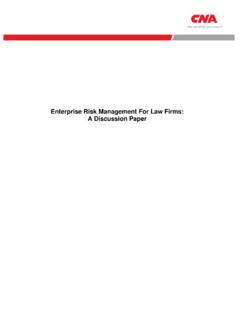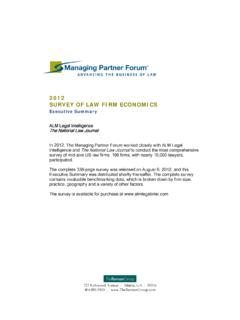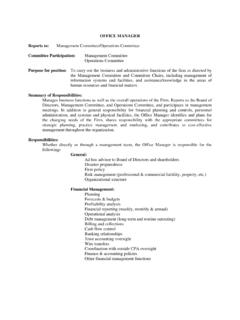Transcription of 2018 Law Firms in Transition - altmanweil.com
1 2018. Law Firms in Transition An Altman Weil Flash Survey Contact Altman Weil, Inc. 3959 Welsh Road, Suite 328. Willow Grove, PA 19090. (610) 886-2000. Thomas S. Clay: Eric A. Seeger: 2018. Law Firms in Transition An Altman Weil Flash Survey Contributing Authors Thomas S. Clay Eric A. Seeger Copyright 2018 Altman Weil, Inc. All rights reserved. No part of this work may be reproduced or copied in any form or by any means without prior written permission of Altman Weil, Inc. For reprint permission, contact Altman Weil, Inc. 3959 Welsh Road, Suite 328, Willow Grove, PA 19090. or 2018 LAW Firms IN Transition . Table of Contents Introduction .. i Market Forces .. 1. Leading Change .. 13. Productivity .. 25. Law firm Profitability .. 36. Lawyer Staffing Strategies .. 43. Efficiency of Legal Service Delivery .. 53. Pricing Strategies.
2 62. Financial Performance .. 74. Bonus 85. Participant Demographics .. 87. Appendices: firm Size; Innovation; Differentiation; Trends .. 88. An Altman Weil Flash Survey [This page is intentionally blank.]. 2018 LAW Firms IN Transition . Law Firms in Transition 2018. Now in its tenth year, with half the universe of US law THE 2018 SURVEY. Firms with 50 or more lawyers participating, the Law Firms in Transition Survey has become a unique WE POLLED: resource for insight on law firm strategy and the Managing Partners and Chairs at 801 US law opinions of firm leaders. The annual survey has Firms with 50 or more tracked a continual shift in awareness, acceptance lawyers. and some persistent resistance to legal market change. As market perceptions among law firm PARTICIPATION: 398 Firms (50%) including leaders have evolved over the last decade, we have 45% of the 500 largest seen new operational tactics emerge and take hold in US law Firms and 52%.
3 Some Firms resulting in real improvements in of the AmLaw 200. profitability and long-term sustainability. participated. WHAT'S NEW: A decade of change: 2009-2018. Look for New' flags in the In 2009, US law Firms were confronting the effects of upper right corner of pages to indicate the Great Recession and facing market dynamics questions we asked for they had never faced before. Corporate client the first time in 2018. purchasing strategies changed quickly and significantly. Clients were pulling back on large amounts of legal work, canceling projects, railing about egregious inefficiencies in law firm service delivery, and demanding and receiving enormous discounts on hourly rates. Lawyers who had consistently billed 2,000 hours a year saw their work all but dry up. Senior partners, watching their retirement accounts plummet, dug in their heels and resolved not to retire.
4 Law Firms reacted by laying off thousands of (mostly younger) lawyers and staff and withdrew their offers to new graduates. Cost-cutting became the norm and major expenses were deferred. Many Firms hunkered down and went into survival mode. Pundits, law firm leaders and, yes, some consultants issued hyperbolic proclamations that law practice would never be the same. Altman Weil's Law Firms in Transition Survey was born out of the confusion and anxiety of that time. Our objective was to assess the nature and disruptive influence of the recession and its aftermath, gather hard data on what law Firms were doing in An Altman Weil Flash Survey i 2018 LAW Firms IN Transition . response to new challenges and opportunities, and determine which responses were achieving the best outcomes. We sought to provide clear, credible information that would facilitate law firm planning and operational decision making.
5 Ten years on, we think law Firms face a different kind of threat. The recession was a 'known' event (albeit severe) to be endured and managed as law Firms had done in prior economic downturns. The threat in 2018 is broader and more nuanced, arising primarily from the sweeping force of technology evolution over the last two decades that has resulted in the commoditization and commercialization of more and more legal services. This new threat wasn't caused by the recession, but the recession was clearly an accelerant. Naturally, law Firms have focused on their financial health and performance in the aftermath of the recession. Although few have recovered to pre-recession levels, most have achieved a reasonable level of 'comfort' on the rising tide of general economic recovery. We think this creates a false sense of security and a mis-direction of focus in many law Firms .
6 In reacting to the last crisis, they fail to recognize the next. Most law Firms continue to plan for short-term, incremental improvements in performance, while deferring or slow-walking more forward-looking actions to address long-term, systemic threats. In 69% of law Firms , partners resist most change efforts. 2018 Law Firms in Transition Managing the Transition Clearly, there was no extinction event that made law Firms irrelevant after the recession. However, there was a hastening of the pace of Transition into new operating modes. Most law Firms have been able to manage their transitions to achieve at least moderate performance gains or to maintain acceptable performance by just keeping on. Few Firms have taken full advantage of the disruption as an opportunity and run with it to distinguish themselves from competitors.
7 Being a thought leader and early An Altman Weil Flash Survey ii 2018 LAW Firms IN Transition . adopter of new methodologies and technologies is a clear differentiator that few law Firms have embraced. Can law Firms sustain their current position of moderate, reactive change over the long term? Or will external market forces beyond their control ultimately compel a tipping point? After ten years, this is still an open question in the minds of too many law firm leaders, and for most partners. Equity partners are not busy enough in 51% of all law Firms . 2018 Law Firms in Transition Real and persistent threats to the status quo Clients want greater cost effectiveness and value and they are in a position to insist. This is not new, but the recession accelerated the demand for greater efficiency and lower overall costs. Clients are clamoring for more cost-effective legal services and technology-driven process improvements.
8 A host of alternative service providers have created a new set of lower-priced competitors for many law Firms . If a firm does not provide reliably high-quality outcomes and client service at predictable, agreeable prices, there are other providers that will. The overall demand for legal services (billable hours) has decreased in the aggregate since the recession, and all of the dynamics that affect hours available to traditional law Firms clearly indicate a continuing downward trend. Commoditization, new technology tools, and 'non-traditional' competitors are all permanent changes to a post-recession market. Demand for law firm services will not return to pre- recession levels ever. As a result, there are too many lawyers in many law Firms . Average billable hours have shrunk by hundreds of hours per attorney since before the recession and are unlikely to rebound unless the oversupply of lawyers decreases significantly.
9 More work is going in-house, being redirected to non-law firm providers and being redefined or eliminated through the application of technology. An Altman Weil Flash Survey iii 2018 LAW Firms IN Transition . 59% of law Firms are not feeling enough economic pain to motivate more significant change. 2018 Law Firms in Transition Is urgent change really necessary? Balanced against these external threats is a fundamental truth - law Firms still make a lot of money. Overall, law firm partners continue to enjoy very healthy incomes. Revenue, profit and income growth may have slowed in many Firms but remain at historically high levels. This reality often impedes any serious interest in change among partners who would normally be expected to drive it. An improving economy has made law Firms think they can raise rates more aggressively again to drive profit growth.
10 But this kind of thinking may create a false sense of security. There is a short-term threat posed by the next inevitable downturn which will put pressure on Firms that are already less resilient than they should be. But more importantly, there is also a long-term threat to overall sustainability that cannot be ignored. Long-term sustainability If Firms are doing reasonably well economically by making limited course corrections, why should they embark on a long-term innovation and change mission? We believe that even though the future is unclear, there are some fundamental truths that must be acknowledged: 1. Law Firms are no longer operating in a closed system in which virtually all legal service providers play by the same rules. There are outside players with outside money and a commercial mindset who are offering viable legal service alternatives to clients.











